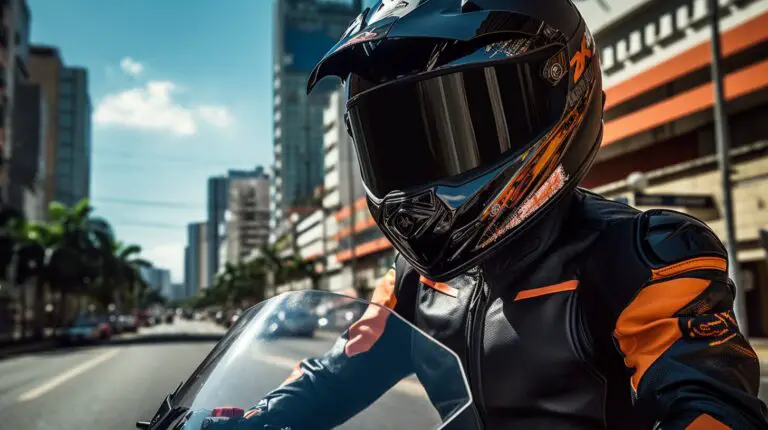Motorcycle helmets are mandatory for all motorcyclists in Brazil according to the country’s helmet laws. These laws are in place to ensure the safety and security of riders, as well as to prevent injuries and fatalities on the roads. Brazil has implemented strict regulations surrounding motorcycle helmet usage, aiming to protect its citizens and promote responsible riding.
Key Takeaways:
- Motorcycle helmets are required by law in Brazil.
- The helmet laws are in place to prioritize rider safety and reduce the risk of injuries.
- Mandatory helmet use is crucial to prevent fatalities and promote responsible riding.
- Brazilian authorities have implemented strict regulations to enforce helmet usage.
- Complying with these laws is essential to avoid penalties and potential accidents.
Understanding Brazil’s Motorcycle Helmet Laws
The helmet regulations in Brazil are governed by specific laws that dictate the requirements for motorcycle riders. According to the source, motorcycle helmets are mandatory in Brazil, meaning that all motorcyclists must wear helmets while riding. This regulation is in place to ensure the safety and security of riders on the roads.
One of the main reasons for the mandatory helmet use in Brazil is the rising number of armed robberies at gas stations. Criminals often target motorcyclists who are not wearing helmets, making them more vulnerable to theft and violence. As a result, the helmet requirement aims to protect riders and deter potential criminals.
While the text does not provide detailed information on the penalties or enforcement mechanisms related to helmet usage in Brazil, it emphasizes that wearing helmets is mandatory. The specific consequences for non-compliance may vary depending on the region and local authorities.
By implementing these motorcycle helmet laws and regulations, Brazil aims to ensure the safety and well-being of its motorcycle riders. It is crucial for riders to adhere to these regulations to protect themselves and reduce the risk of accidents and injuries.
| Key Points: |
|---|
| Helmets are mandatory for motorcyclists in Brazil. |
| The requirement is primarily for security purposes, aiming to reduce armed robberies targeting riders. |
| The penalties and enforcement mechanisms may vary by region. |
Mandatory Helmet Use in Brazil
The mandatory helmet use in Brazil aims to ensure the safety of motorcycle riders and passengers. According to the Motorcycle Helmet Laws published by the Brazilian government, all motorcyclists must wear helmets when riding on public roads. This requirement is in place to protect individuals from head injuries in the event of an accident, as helmets have been proven to reduce the risk of fatalities and serious injuries.
In recent years, Brazil has witnessed an alarming increase in armed robberies targeting motorcyclists, particularly at gas stations. As mentioned in the Security Measures report released by the Brazilian Ministry of Justice, the mandatory helmet use serves as a preventative measure to combat these crimes. By requiring all motorcyclists to wear helmets, it becomes more difficult for potential robbers to identify their targets, providing an additional layer of security for riders.
The Brazilian government takes helmet safety seriously and has implemented regulations to ensure that helmets meet specific standards. The Brazilian National Institute of Metrology, Quality, and Technology (INMETRO) sets the guidelines for helmet safety standards, including impact resistance, durability, and comfort. All helmets sold in Brazil must bear the INMETRO certification seal, indicating that they meet the required safety standards.
| Requirement | Purpose | Enforcement |
|---|---|---|
| All motorcyclists must wear helmets | To ensure safety and reduce head injuries | Penalties may apply for non-compliance |
| Mandatory helmet use helps prevent robberies | To increase security for riders | Enforcement efforts by authorities |
| Helmets must meet INMETRO safety standards | To guarantee quality and effectiveness | Certification seal required for sale |
It is important for all motorcycle riders and passengers in Brazil to comply with the mandatory helmet use. By doing so, they are not only protecting their own safety but also contributing to a safer riding environment for all. The government’s efforts in enforcing helmet laws and promoting helmet safety standards reflect their commitment to prioritize the well-being of motorcyclists across the country.
Reasons for Helmet Requirement in Brazil
Brazil’s helmet requirement is primarily driven by the goal of enhancing rider safety and reducing the risk of injuries. According to the second source, there is a helmet law in place that mandates the use of helmets for all motorcyclists. This law aims to protect riders from the potential dangers and consequences of riding without proper head protection.
One of the main reasons behind this requirement is the rising number of armed robberies at gas stations, as mentioned in the same source. Wearing helmets can help deter potential criminals and make motorcyclists less vulnerable to theft. By ensuring that all riders wear helmets, the law aims to provide an added layer of security for individuals who rely on motorcycles as their primary mode of transportation.
The helmet requirement also aligns with broader efforts to promote motorcycle safety in Brazil. By making helmet usage mandatory, the government aims to create a culture of safety consciousness among riders. Wearing helmets not only reduces the risk of head injuries but also plays a crucial role in minimizing fatalities in motorcycle accidents, as supported by various studies.
| Helmet Requirement in Brazil | Benefits |
|---|---|
| Enhances rider safety | Reduces the risk of head injuries |
| Reduces fatalities in motorcycle accidents | Deters armed robberies at gas stations |
| Fosters a culture of safety consciousness | Protects vulnerable road users |
Summary:
With the goal of enhancing rider safety and reducing the risk of injuries, Brazil has implemented a helmet requirement for all motorcyclists. This requirement is motivated by the increasing number of armed robberies at gas stations and the need to protect vulnerable road users. By enforcing mandatory helmet usage, Brazil aims to promote a culture of safety consciousness among riders and minimize the occurrence of head injuries and fatalities in motorcycle accidents.
Helmet Safety Standards in Brazil
Motorcycle helmets in Brazil are required to meet specific safety standards to ensure their effectiveness in protecting riders. These safety standards are set by the National Institute of Metrology, Quality, and Technology (Inmetro), which is responsible for certifying and regulating the quality of various products in Brazil, including motorcycle helmets.
Inmetro’s certification process for motorcycle helmets involves rigorous testing to assess their performance in different scenarios, such as impact resistance, penetration resistance, and retention system effectiveness. Helmets that meet the approved safety standards are then marked with the Inmetro seal, indicating their compliance with the regulations.
To maintain the safety standards of motorcycle helmets, Brazil has adopted the United Nations Economic Commission for Europe (UNECE) Regulation No. 22, following international guidelines for helmet design, construction, and performance. This regulation ensures that helmets sold in Brazil meet the minimum safety requirements established by UNECE, including specifications for shell construction, visor durability, and peripheral vision.
| Helmet Safety Standards | Requirements |
|---|---|
| Impact Resistance | Helmets must withstand a certain level of impact without causing head injuries. |
| Penetration Resistance | Helmets should provide protection against sharp objects that could penetrate the shell. |
| Retention System Effectiveness | The helmet’s strap system must effectively secure the helmet to the wearer’s head. |
| Shell Construction | The helmet’s outer shell should be constructed in a way that absorbs and distributes the impact force. |
| Visor Durability | Visors must be able to withstand impact and maintain their integrity during a collision. |
| Peripheral Vision | Helmets should not restrict the rider’s field of vision, ensuring clear visibility. |
Ensuring that motorcycle helmets adhere to these safety standards not only protects riders from head injuries but also contributes to the overall safety of Brazil’s roads, reducing the risk of fatal accidents and severe injuries.
Enforcement of Helmet Laws in Brazil
Law enforcement agencies in Brazil actively enforce helmet laws and failure to comply may result in penalties. According to the Brazilian helmet regulations, all motorcyclists are required to wear helmets for their own safety. The implementation of these laws aims to reduce the number of motorcycle accidents and protect riders from potential head injuries.
In recent years, there has been a growing concern about armed robberies at gas stations in Brazil. As a result, the mandatory use of motorcycle helmets has been reinforced to enhance security measures. Wearing a helmet not only safeguards the rider from potential accidents but also reduces the risk of being targeted by criminals due to the anonymity it provides.
While specific information on penalties or enforcement mechanisms is not provided, it is imperative for motorcyclists to comply with the helmet laws in Brazil to avoid legal consequences. This includes wearing a helmet that meets the safety standards established by the Brazilian authorities. Helmets must be of high quality and properly fitted to ensure maximum protection in the event of an accident.
| Key Points: | Enforcement of Helmet Laws in Brazil |
|---|---|
| Helmets are mandatory | Motorcyclists must wear helmets in Brazil |
| Enhanced security measures | Helmet usage helps prevent armed robberies at gas stations |
| Compliance is crucial | Failure to wear helmets may result in penalties |
| Focused on safety | Helmets must meet safety standards and be properly fitted |
It is essential for both residents and tourists in Brazil to be aware of and adhere to the motorcycle helmet laws. By doing so, individuals can contribute to the overall efforts to improve road safety and protect themselves from potential risks and accidents.
Impact of Helmet Usage on Motorcycle Safety
Wearing helmets in Brazil has been proven to significantly improve motorcycle safety and reduce the severity of accidents. According to data from the Brazilian Ministry of Health, helmet use can reduce the risk of fatal head injuries by up to 40%. This statistic alone highlights the importance of mandatory helmet requirements for motorcyclists in Brazil.
In addition to reducing the risk of fatalities, helmets also play a crucial role in minimizing the severity of injuries. The Brazilian Society of Neurosurgery reports that wearing helmets can reduce the likelihood of severe brain injury by approximately 70%. By providing a protective barrier between the head and any potential impact, helmets act as a crucial safety measure for motorcyclists.
Furthermore, studies have shown that helmets can significantly decrease the overall medical costs associated with motorcycle accidents. The World Health Organization estimates that for every dollar invested in motorcycle helmets, there is a potential savings of up to $3 in medical expenses. This not only benefits individuals but also alleviates the burden on healthcare systems.
The Importance of Proper Helmet Fit
While wearing a helmet is mandatory in Brazil, it is equally important to ensure the helmet fits properly. A well-fitting helmet offers maximum protection by reducing the risk of it coming off during an accident or impacting the rider’s vision. It should sit snugly on the head, covering the forehead and resting just above the eyebrows.
Motorcyclists should also consider the quality of the helmet they choose. Opting for helmets that meet recognized safety standards, such as the Brazilian National Institute of Metrology, Quality, and Technology (INMETRO) certification, ensures the helmet has undergone rigorous testing and meets specific safety requirements.
| Benefits of Helmet Usage in Brazil |
|---|
| Reduces the risk of fatal head injuries by up to 40% |
| Decreases the likelihood of severe brain injury by approximately 70% |
| Potential savings of up to $3 in medical expenses for every dollar invested in helmets |
Helmet Use and Robbery Prevention
The requirement for helmets in Brazil not only ensures the safety of motorcyclists but also plays a crucial role in deterring armed robberies at gas stations. The increasing number of incidents involving motorcycle riders as perpetrators of robberies has led to the implementation of strict helmet laws in the country. By making it mandatory for all motorcyclists to wear helmets, Brazil aims to enhance overall security and protect both riders and the general public.
Studies have shown that the use of helmets hampers criminal activities, particularly at gas stations where many robberies occur. The visibility of a motorcyclist wearing a helmet makes it more challenging for criminals to conceal their identity or execute quick getaways. By making helmets compulsory, Brazil has introduced an effective measure to discourage potential criminals, ensuring a safer environment for both motorcyclists and the community.
| Benefits of Helmet Use in Robbery Prevention |
|---|
| Reduces the likelihood of being targeted by criminals due to increased visibility |
| Aids in the identification and apprehension of criminals involved in robberies |
| Acts as a deterrent for potential criminals due to the increased risk of identification |
By prioritizing helmet use, the Brazilian government sends a clear message that safety and security are of utmost importance. It is crucial for motorcyclists to comply with the helmet legislation in Brazil, not only for their own protection but also to contribute to the prevention of criminal activities. Together, we can foster a culture of safety and deter armed robberies, making the roads and gas stations a safer place for everyone.
Importance of Helmet Fit and Quality
When choosing a helmet in Brazil, it is essential to consider both the fit and quality to ensure optimal safety. A well-fitting helmet not only provides comfort but also plays a crucial role in protecting the rider’s head in the event of an accident. It should sit snugly on the head, covering the forehead, temples, and the back of the head, without impeding vision or causing discomfort. The helmet’s chin strap should also be securely fastened to keep it in place during a collision or sudden impact.
Moreover, the quality of the helmet is equally important. Helmets that meet the required safety standards offer better protection against severe head injuries. In Brazil, helmets must adhere to specific safety regulations, ensuring they offer adequate impact resistance and protection from penetrating objects. Look for helmets that bear certification marks such as INMETRO (Brazil’s National Institute of Metrology, Quality, and Technology) or DOT (U.S. Department of Transportation) to ensure compliance with safety standards.
Importance of Helmet Fit:
- Provides comfort and stability during rides.
- Ensures proper coverage of crucial areas of the head.
- Prevents the helmet from flying off in case of an accident.
- Allows for clear visibility and unobstructed hearing.
Importance of Helmet Quality:
- Offers better protection against severe head injuries.
- Meets safety standards set by regulatory authorities.
- Provides impact resistance and protection from penetrating objects.
- Ensures reliability and durability.
Remember that investing in a high-quality helmet and ensuring a proper fit is an investment in your safety as a motorcyclist. By prioritizing these factors, you can ride with confidence, knowing that you have taken the necessary precautions to protect yourself on the road.
| Helmet Fit | Helmet Quality |
|---|---|
| Provides comfort and stability during rides. | Offers better protection against severe head injuries. |
| Ensures proper coverage of crucial areas of the head. | Meets safety standards set by regulatory authorities. |
| Prevents the helmet from flying off in case of an accident. | Provides impact resistance and protection from penetrating objects. |
| Allows for clear visibility and unobstructed hearing. | Ensures reliability and durability. |
By understanding the importance of both helmet fit and quality, riders can make informed decisions when selecting a helmet in Brazil. Prioritizing these factors not only enhances individual safety but also contributes to the overall improvement of motorcycle safety regulations in Brazil.
Supporting Motorcycle Safety Initiatives in Brazil
Several organizations in Brazil actively work towards promoting motorcycle safety and increasing awareness of helmet usage. These initiatives play a vital role in educating the public about the importance of wearing helmets and adhering to the motorcycle helmet laws in Brazil. By collaborating with government agencies, advocacy groups, and motorcycle manufacturers, these organizations strive to create a safer riding environment for motorcyclists.
One such organization is the Brazilian Motorcycle Safety Association (BMSA), which focuses on implementing comprehensive safety programs and campaigns. BMSA conducts training sessions and workshops to educate motorcyclists on proper helmet usage, emphasizing the need for helmets that meet the stringent safety standards set by Brazilian regulations. They also encourage riders to choose helmets with a proper fit, as this ensures optimal protection in the event of an accident.
In addition to BMSA, the National Traffic Council (CONTRAN) plays a crucial role in enforcing motorcycle helmet laws in Brazil. CONTRAN works in close collaboration with law enforcement agencies to ensure compliance with the helmet requirement. Through awareness campaigns and strict enforcement measures, CONTRAN aims to reduce the number of motorcycle accidents and fatalities in the country.
Initiatives by CONTRAN to Promote Helmet Usage
CONTRAN has implemented various measures to promote helmet usage and raise awareness among motorcyclists. One such initiative is the integration of helmet checkpoints at strategic locations across Brazil. These checkpoints serve as a reminder for riders to wear their helmets and comply with the law. Moreover, CONTRAN has partnered with local authorities to conduct public events and roadshows, distributing educational materials and free helmets to underserved communities.
The collective efforts of these organizations and initiatives contribute to a safer motorcycle riding environment in Brazil. By emphasizing the importance of wearing helmets and promoting compliance with the country’s helmet laws, they strive to reduce the number of injuries and fatalities caused by motorcycle accidents. Through continuous education and advocacy, these efforts aim to instill a culture of responsible riding and improve overall road safety in Brazil.
| Organization | Focus Area | Initiatives |
|---|---|---|
| Brazilian Motorcycle Safety Association (BMSA) | Education on proper helmet usage and fit | Training sessions, workshops, and advocacy campaigns |
| National Traffic Council (CONTRAN) | Enforcement of helmet laws | Integration of helmet checkpoints, awareness campaigns, and public events |
Promoting Safe Motorcycle Riding in Latin America
Ensuring safe motorcycle riding practices, including helmet use, is crucial for riders across Latin America, including Brazil. As part of ongoing efforts to improve motorcycle safety, Brazil has implemented motorcycle helmet legislation to protect riders from potential accidents and injuries.
In recent years, there has been growing concern over the increasing number of armed robberies targeting motorcycle riders at gas stations in Brazil. To address this issue, the Brazilian government has made helmet usage mandatory, not only to protect riders from accidents but also to enhance their safety from potential criminal activities.
The helmet law in Brazil is designed to provide a higher level of security for riders and deter potential robbers. By making helmet usage mandatory, the law aims to reduce vulnerability and increase the safety of motorcyclists, especially at gas stations where robberies are most prevalent.
| Benefits of Helmet Usage in Brazil: |
|---|
| 1. Increased protection from accidents and injuries |
| 2. Enhanced security and reduced vulnerability to robbery |
| 3. Compliance with Brazilian motorcycle safety regulations |
Through strict enforcement of motorcycle helmet laws, Brazil aims to improve overall motorcycle safety and reduce the risks associated with riding without head protection. It is essential for riders to understand and comply with these regulations to ensure their own safety and well-being when on the road.
Are Motorcycle Helmets Required in South American Countries?
Motorcycle helmet requirements in chile vary across South American countries. In Chile specifically, motorcycle riders are required to wear approved motorcycle helmets conforming to certain safety standards. These regulations aim to ensure the safety of riders on the road and reduce the risk of head injuries in case of accidents. Respecting these motorcycle helmet requirements is crucial for riders in Chile.
Conclusion
Motorcycle helmets are required in Brazil to prioritize rider safety and reduce the risk of severe injuries or fatalities. According to the second source, there is a helmet law in place, making it mandatory for all motorcyclists to wear helmets. This requirement is primarily driven by security concerns, as mentioned in the same source, due to the increasing number of armed robberies at gas stations.
While specific information on penalties and enforcement mechanisms related to helmet usage in Brazil is not provided in this article, it is clear that wearing helmets is a legal requirement. Adhering to these regulations helps create a safer environment for motorcyclists on the roads and reduces the likelihood of life-threatening accidents.
By following Brazil’s motorcycle helmet laws and regulations, riders can significantly decrease the risk of head injuries, which are one of the most common types of injuries sustained in motorcycle accidents. Wearing a helmet can offer crucial protection to the rider’s head, skull, and brain in the event of a crash or collision.
Therefore, it is essential for all motorcyclists in Brazil to ensure they have a helmet that meets the country’s safety standards and fits properly. The use of high-quality helmets that are correctly fitted can significantly enhance the effectiveness of protection in the event of an accident.
FAQ
Q: Are motorcycle helmets required in Brazil?
A: Yes, according to the second source, there is a helmet law in place and all motorcyclists must wear helmets.
Q: What is the reason for the helmet requirement in Brazil?
A: The primary reason for the helmet requirement in Brazil is for security purposes, as mentioned in the same source, due to the increasing number of armed robberies at gas stations.
Q: Do you have any information on the penalties or enforcement mechanisms related to helmet usage in Brazil?
A: The text does not provide specific information on the penalties or enforcement mechanisms, but it confirms that wearing helmets is mandatory.







